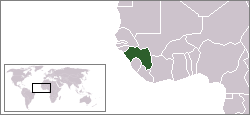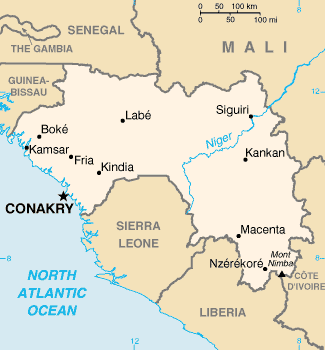| Revision as of 07:14, 6 March 2004 editPteron (talk | contribs)Extended confirmed users1,254 edits added List of African writers (by country)#Guinea← Previous edit | Revision as of 08:20, 6 March 2004 edit undoPteron (talk | contribs)Extended confirmed users1,254 editsmNo edit summaryNext edit → | ||
| Line 59: | Line 59: | ||
| * ] | * ] | ||
| ''See also'': ] | ''See also'': ] | ||
| ------------------------------- | ------------------------------- | ||
Revision as of 08:20, 6 March 2004
| |||||
| National motto: Xxxxx | |||||
 | |||||
| Official language | French (official), Fula, Arabic, others | ||||
| Capital | Conakry | ||||
| (optionally) Capital's coordinates | 9° 30' N, 13° 43' W | ||||
| (optionally) Largest City | Conakry | ||||
| President | Lansana Conté | ||||
| Area - Total - % water | Ranked 75th 245,857 km² Negligible | ||||
| Population
- Density | Ranked 83rd
30.4/km² | ||||
| GDP (PPP)
- GDP/head | Ranked 112th
$2,100 | ||||
| Currency | Guinean franc (FG) | ||||
| Time zone | UTC ) | ||||
| Independence | 2 October 1958, from France | ||||
| National anthem | Liberté (Liberty) | ||||
| Internet TLD | .GN | ||||
| Calling Code | 224 | ||||
The Republic of Guinea is a nation of northwest Africa. Independent from France since 1958, Guinea did not hold democratic elections until 1993 when Gen. Lansana Conte (head of the military government) was elected president in disputed balloting. Security clampdowns continue, although not as severe as in earlier decades. Reelected in 1998, the President faced growing criticism in 1999 for his jailing of a major opposition leader and widespread economic malaise. Unrest in Sierra Leone also continued to threaten Guinea's stability.
Guinea possesses major mineral, hydropower, and agricultural resources, yet remains a poor underdeveloped nation. The agricultural sector employs 80% of the work force. Guinea possesses over 25% of the world's bauxite reserves and is the second largest bauxite producer. The mining sector accounted for about 75% of exports in 1998. Long-run improvements in government fiscal arrangements, literacy, and the legal framework are needed if the country is to move out of poverty. The government made encouraging progress in budget management in 1997-99. Even with a recovery in prices for some of Guinea's main commodity exports, annual GDP is unlikely to increase by more than 5% in 2000-2001.
The capital is Conakry.

From the CIA World Factbook 2000 and the U.S. Department of State website. Not Wikified.
- History of Guinea
- Geography of Guinea
- Demographics of Guinea
- Politics of Guinea
- Economy of Guinea
- Communications in Guinea
- Transportation in Guinea
- Military of Guinea
- Foreign relations of Guinea
See also: List of writers from Guinea
A guinea was an English coin, see guinea coin.